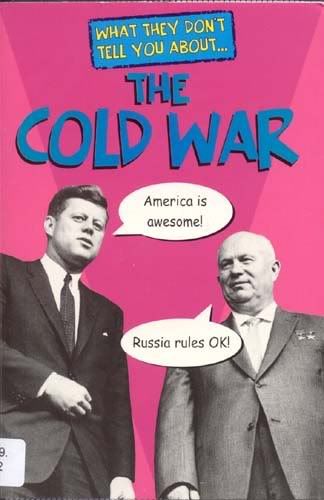Essentially What Ended the Cold War? (Non-Rocky Variant) Part II
 In part one we learned that planned/communist systems tend to stagnate an economy, while market/capitalist systems lend themselves to growth in the economy. (Remember, that this is a highly simplified explanation.)
In part one we learned that planned/communist systems tend to stagnate an economy, while market/capitalist systems lend themselves to growth in the economy. (Remember, that this is a highly simplified explanation.)Now we'll look at why this helped lead the end of the Cold War. Really, it's very simple. As the Cold War entered it's fifth decade, both the US and the USSR had amassed vast nuclear arsenals capable of destorying the planet several times over. Spurred on by worldwide concern for the survival of the human race and such memorable bumper stickers like "Arms are for hugging" and "Build schools not bombs" the rivals did agree to control and/or limit the production and deployment of some such weapons. However, these agreements only applied to certain types of weapons and the bomb building continued, much to the chagrin of shelterless schoolchildren the world over.
So what does bomb making have to do with the economy? Bombs ain't cheap. At least not these kind. The bomb making continued to chew up hefty chunks of the economies of the Cold Warriors. But while the economy of the West continued to grow, the Soviet economy had been stagnating for years. The USSR was not able to keep up with the Jones' in the arms race and provide an acceptable quality of life for it's citizens. They couldn't even get a salami sandwhich. Well, maybe if they were in the Politburo or something. In reality, the Soviet system had been crumbling from the inside for at least a decade. But because the government controls pretty much all the information that goes in or out of the country, no one on the outside knew how bad things really were. A key moment in this drama occured in the 1980's at a summit between Reagan and Gorbachev in Iceland. I'll quote an expert:
Wait, that wasn't an expert, that was me.He [Regan] increased defense spending and floated the idea of a
nuclear missile "shield" called the Strategic Defense Initiative (SDI) and
dubbed "Star Wars" by his critics. SDI caused waves of protest from the Soviet
Union, but also from many within the United States. The nuclear doctrine of
Mutual Assured Destruction (MAD) had been the centerpiece for keeping the wary
peace between the rivals for decades. The idea that no defense against nuclear
weapons was best, since both sides understood the devastation that would
accompany thermo-nuclear war. Hence the name Mutual Assured Destruction. SDI
threatened to upset this precarious balance. With a defense system in place, in
theory the US would have the first-strike capability against the USSR without
fear of repercussions. For obvious reasons, the Soviets didn't care for this
policy, but the fear in the US was that SDI would ratchet up tensions and the
Soviets may feel cornered and would launch a strike before the US had the system
in place. As it was, SDI was, and probably still is, years if not decades from
being a practical reality. But the idea, and Reagan's refusal to take it off the
table at a summit with Gorbachev in Iceland, caused the USSR to continue to
spend a disproportionate part of their treasury on defense and further
contributed to the decline of it's economy.
It wasn't all economics that ended the Cold War. Unrest among the people of the Soviet satelite country's, especially Poland, finally reached a head. Leaders emerged in these nations that challenged the authority of their Soviet-influenced overlords. They demanded more personal freedoms, freedom in the press, freedom of political will, you know, nothing major. In earlier days such appeals would have been answered with the boots of Red Army soldiers and cordiality of a Kalashnikov rifle. Gorbachev did nothing, and the people were bold. They tore down the Berlin wall while soldiers looked on. Not to say that there was no bloodshed in the wake of these actions, but it was, by anyones assesment, extremely minor.
My humble analysis can't do the subject the justice it truly deserves and I would again encourage anyone interested on the subject of the Cold War to read...The Cold War. If you missed it, you can read my review here. Hope this answered some of your questions, Josh. That is afterall this blogs reason for being.


